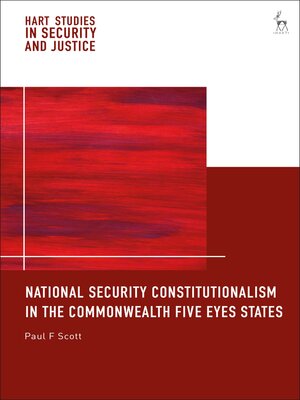National Security Constitutionalism in the Commonwealth Five Eyes States
ebook ∣ Hart Studies in Security and Justice
By Paul F Scott

Sign up to save your library
With an OverDrive account, you can save your favorite libraries for at-a-glance information about availability. Find out more about OverDrive accounts.
Find this title in Libby, the library reading app by OverDrive.



Search for a digital library with this title
Title found at these libraries:
| Library Name | Distance |
|---|---|
| Loading... |
This book examines the constitutional treatment of national security in the UK, Canada, Australia and New Zealand.
These four states share their Commonwealth heritage and are members, alongside the USA, of the Five Eyes intelligence-sharing alliance. The book takes a comparative approach to the institutions through which, and tools with which, these four states seek to protect their national security against the threats of both terrorism and hostile state activity and how they have evolved over time. It identifies and examines the various specialised institutions, inside and outside of legislatures, which have grown up to oversee the exercise of public power for national security purposes while maintaining the required secrecy. It argues that the extent of the borrowing and sharing between these jurisdictions in the domain of national security, now and in the past, permits us to talk about a Commonwealth model of national security constitutionalism.
These four states share their Commonwealth heritage and are members, alongside the USA, of the Five Eyes intelligence-sharing alliance. The book takes a comparative approach to the institutions through which, and tools with which, these four states seek to protect their national security against the threats of both terrorism and hostile state activity and how they have evolved over time. It identifies and examines the various specialised institutions, inside and outside of legislatures, which have grown up to oversee the exercise of public power for national security purposes while maintaining the required secrecy. It argues that the extent of the borrowing and sharing between these jurisdictions in the domain of national security, now and in the past, permits us to talk about a Commonwealth model of national security constitutionalism.







